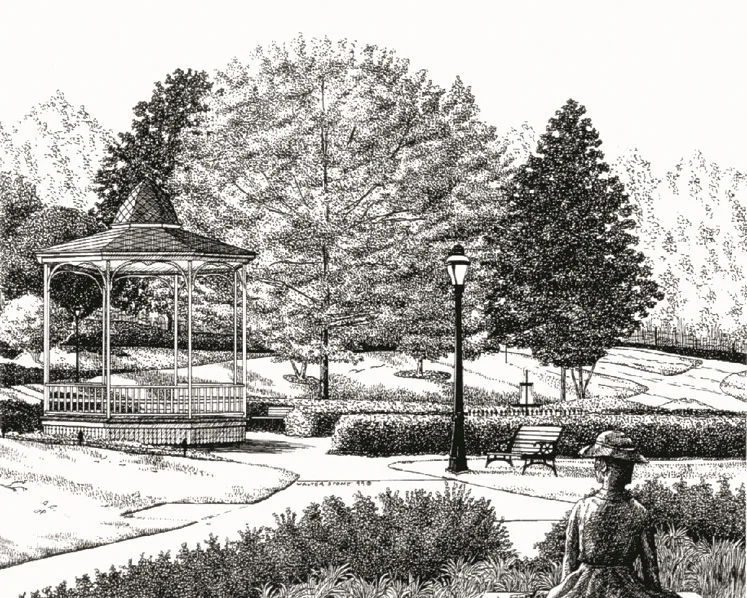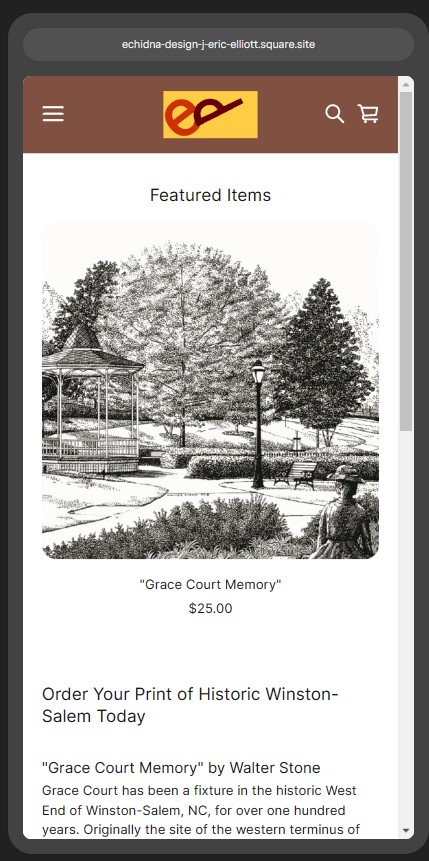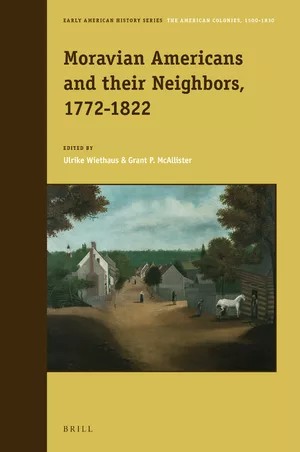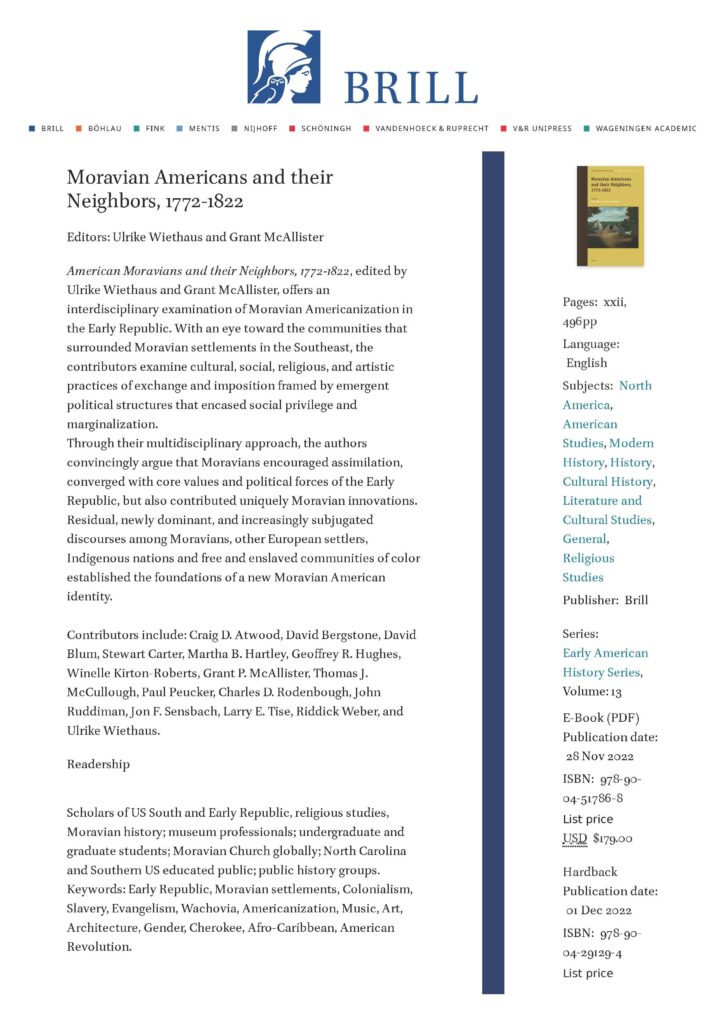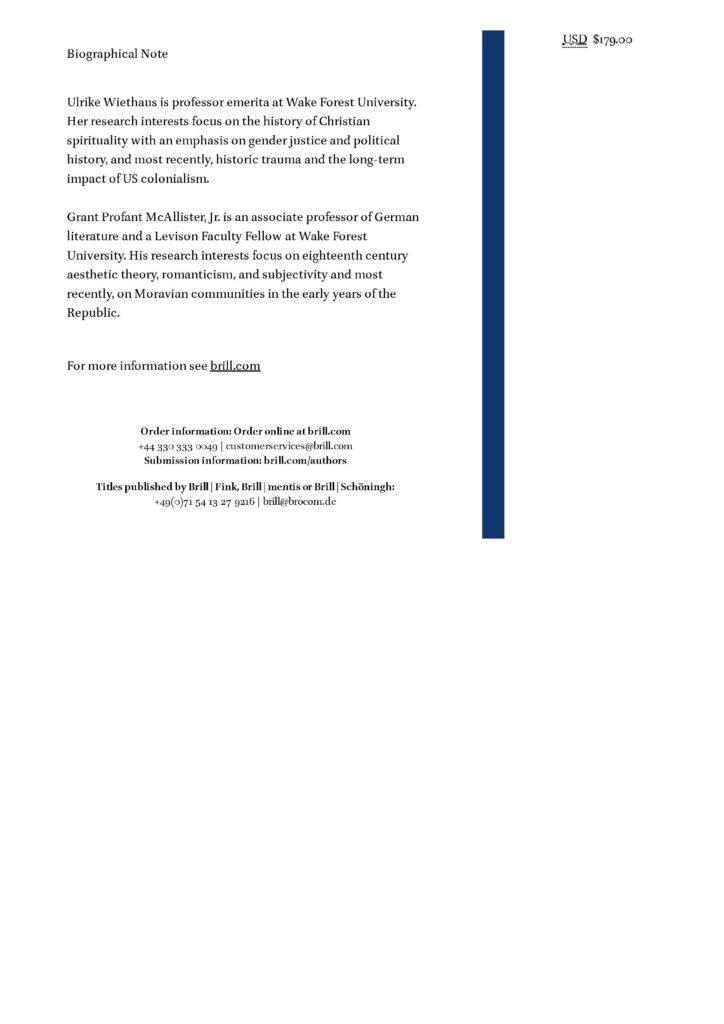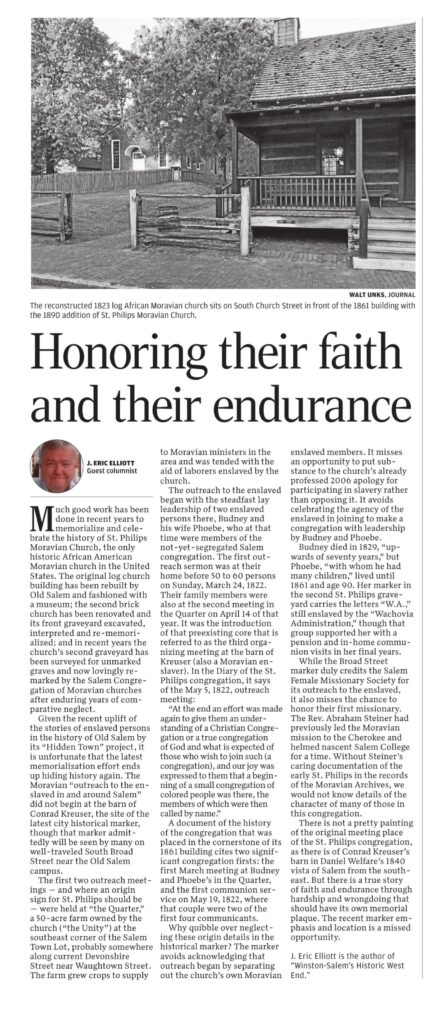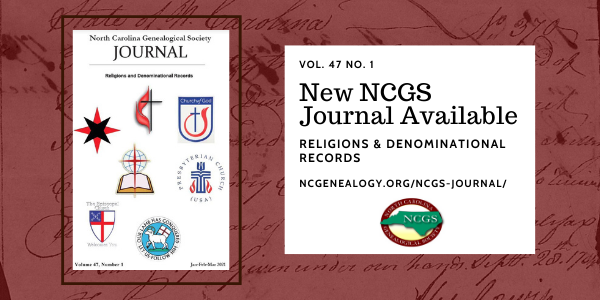I write to recommend the recent publication of Moravian Americans and their Neighbors, 1772-1822 (Brill, 2023), volume thirteen in the publishers’ Early American History Series “The American Colonies, 1500-1830.”
Edited by professors Ulrike Wiethaus and Grant P. McAllister, both of Wake Forest University, this multidisciplinary collection of essays is a follow-up to presentations made at a September 2020 conference with a similar title organized by the editors and myself. I was then archivist of the Moravian Archives for the Southern Province of the Moravian Church in Winston-Salem, NC, and the Archives was the host for this online international town and gown Reynolda Conference sponsored by Wake and the Andrew W. Mellon Foundation. The event had over 400 participants, and featured presentations by scholars, church historians, archivists, museum and preservation specialists and local researchers and students.
Moravian Church members had established themselves in the British colonies in the 1740s and 1750s in German-speaking Eurocentric local outposts, part of a set-apart worldwide community of Pietist missionaries. The goal of the conference discussions was to better understand the “cultural, social, religious and artistic practices exchanged between Moravians and their white, Indigenous, and free and enslaved African neighbors” in the process of self-identifying as “American.” Video of the online presentations, including several multimedia and performative pieces augmenting conference themes in the book, can still be found on YouTube at the WFU Humanities Institute page (Becoming American: Moravians and Their Neighbors, 1772-1822 – YouTube).
Sustaining such a Philadelphian community that outlasts its founders (without the return of the Lord) perhaps in and of itself necessitates a change in organizational emphasis. However, a Brill book overview hints at specific pressures and influences towards American identity in the first half-century of the Moravians in Salem, NC. The well-documented Moravian community experience, while distinct in its theocratic founding and aspirations, no doubt highlights similar influences on other component populations of an evolving American identity. Themes of earlier Moravian studies on Americanization are found in these pages: generational shifts in the use of English versus German language, the growing desire for personal property and economic freedom, resentments toward overseas regulation of daily life, and increasing racial segregation within the community even as its pastors continued to profess the same unifying message of Grace as Geschwister in Christ. A special emphasis of this volume is the editors’ insistence that the founding in Salem in 1822 of a segregated congregation to minister to free and enslaved people of color (presently known as St. Philips Moravian Church), which included Church members who had previously worshipped alongside their white brothers and sisters, cements a turning point in not just Southern Moravian race relations but in their process of “Americanization”: adopting a racialized self-understanding that altered their presentation of their community with its neighbors.
This “strong programme” (to use a phrase borrowed from sociologists of science) view of white supremacy as a major component of what it meant for a white European to become American has been a controversial label in recent years, cast over more mythic stories of the founding of America, and is perhaps best known through the work of the New York Times’ “1619 Project.” Clearly, the Moravian community did not establish itself in America to promote slaveholding. Yet its mission work was built specifically upon outreach to enslaved and indigenous peoples. Its goals were never to change slavery or challenge it in this temporal realm but to save souls for a heavenly Kingdom. They did not call out slavery as evil sui generis as their Quaker neighbors in North Carolina did. In the years outlined in this study, Moravians increasingly acquiesced to all matters of “outside the community” ideas – often, in the words of contributor and Salem archaeologist Geoffrey Hughes, “by making Americanism acceptably Moravian.”
Foundationally in the volume, Moravian theologian and historian Craig Atwood sketches the vision of the Church in mission by its founder Count Zinzendorf and in practice on the ground by his bishop Joseph Spangenberg. Noted North Carolina historian Larry Tise then highlights the fortuitous entrusting of British deeds to the Moravians’ Wachovia land grant to politically connected James Hutton, who insured their legal title transfer to America at the eve of the American Revolution. Moravian pastor and historian Winelle Kirton-Roberts relays the troubles the worldwide Moravians faced in their first missions to the enslaved in Antigua and Tobago, as their presentation of a European God did not allow room for the incorporation of African expressions and celebrations, a stricture which persisted in missions in America. The Moravian archivist and historian at the Northern Province, Paul Peucker, concludes with a reminder that the church records which are the source material for much existing Moravian scholarship have been occasionally purged of material that would highlight stories not of benefit to the common narrative told by the church about itself to its members and the public. In the multi-volume Records of the Moravians in North Carolina series, translations of Salem Moravian documents begun a hundred years ago by then archivist Adelaide Fries, Fries lists manuscript excerpts to tell primarily a church history narrative, not the story of actions and interactions with neighbors. Those stories are often summarized over or omitted, only to be discovered by those doing original document research.
Next in the volume, a “Convergences” section explores conscious choices made by the Moravians to let go of certain practices and more fully integrate into a new American character. Early American historian John Ruddiman reviews the writings of merchant Traugott Bagge as a delegate for the community during meetings about and after independence. His advocacy in the state assembly assured that the pacifist Moravians would still be allowed to keep their British-granted lands in the new nation and showed the importance of being “in the room where it happened,” not fully aloof from partisan politics. Music historian Stewart Carter highlights the chosen acceptance of more secular music into the sacred music-rich Moravian community with the celebrated public performances of Haydn’s work The Creation, in Bethlehem in 1811, and premiering in the American South in Salem in 1829. Moravian theologian and historian Riddick Weber documents the evolution of the distinctive Moravian choir system of gender segregation and nurture in the period, with increasing rebelliousness to restrictions on whom and how to marry eventually ending communal guidance and the use of the Lot to determine spouses. Moravian and American historian Jon Sensbach, whose work in the 1990s opened to the public much of the “separate Canaan” in the record of the Moravian enslaved, closes this section by analyzing the choices made by a millenialist community that, like the Pilgrims, had “been abandoned by Providence” and “left with America.” Outsiders in an English-speaking place, the America Moravians increasingly chose to join was “white, nationalist and capitalist.”
“Innovations” in the ways Moravians made something both American and Moravian are discussed in a following section. Thomas McCullough, assistant archivist at the Northern Province of the Moravian Church, uses heavy documentation from records of a dozen congregations to show the evolution of secular celebrations of both Independence Day and Washington’s birthday into events clothed and celebrated with spiritual significance, especially in the renewed patriotic fervor after the War of 1812. Interesting to note that nationalism in Germany was being celebrated after the concurrent Napoleonic wars, making patriotism a multinational virtue. Preservationist David Bergstone reviews the slow changes initially to the Salem buildscape of Flurkuchenhaeuser, only to have nave new construction dominated by Greek Revival themes in the mid-nineteenth century and the obliteration of a consistently Moravian style to architecture. The emergence of a hooded entrance and bell cupola as motifs borrowed from Salem Home Church and used as elements in Moravian and community buildings after 1913 became a way to have Moravian roots and modern architecture coexist. Music archivist and historian David Blum looks for evidence of the expansion and co-existence of secular with sacred music in a large variety of preserved Moravian copybooks, handwritten collections of music – instrumental and vocal – that were copied by Moravian ministers for worship use and Moravian students as part of their music education. While Moravians clearly imported German musical culture to America, Blum’s tables show they valued knowledge of all kinds of musical styles whether or not they could be used in worship. Pastors’ copybooks had only a small portion of content in English, but students and instructors at Salem boarding school had a much higher percentage of English pieces. Finally, archaeologist Geoffrey Hughes shows the change in the build and purpose of Salem’s pottery kilns, as Moravians transitioned from making practical but crude earthenware to more refined and decorative pieces to match a demanding and competitive pottery marketplace beyond their community. The community’s investment in a larger and more distinctly industrial organization to pottery production while still subsidizing the business as a community craftsman’s shop shows an on-the-ground accommodation to being both Moravian and American.
The final section of the volume, “Segregation,” contains the clearest arguments for the increasing appearance of racialized thinking into the character of Southern Moravians. The Northern Province of the Moravian Church also had slave-holding members and congregations in the eighteenth century, but later disavowed slavery. They would fight in the Civil War against southern Moravians, and an obelisk at the site of the Moravian boys school in Nazereth, PA, memorializes school graduates who fought on both sides. Martha Hartley, director of Moravian Research for Old Salem Museums and Gardens, helpfully plots the gradual intrusion of enslaved into the streetscape of Salem as documented in Old Salem’s recent “Hidden Town” project. Most Southern Moravian slaveholding prior to 1822 was done at farms in the country congregations around Salem. Although two-thirds of her essay is about the influx and physical marginalization of enslaved after the 1820s, Hartley does not mention by name or number the mills of Francis and Henry Fries – and the fact that in the last census before the Civil War the Fries factories had, with over one hundred persons, the second largest enslaved labor force of any industrial site in the state, only behind the Milton, NC, shops of free black furniture maker Thomas Day. Michael Shirley’s important study on the change wrought in commercial practice and slaveholding by the Fries family in 1840s Salem is largely overlooked in this volume but documents a consequence of “Americanization” changes preceding it. So, too, does the appearance of “Coon Street,” labeled a few blocks south of Salem College on the 1907 Sanborn Fire Map of the area, a Jim Crow-era denigration of an area of African American houses. When you can’t segregate by distance, you do it with labels.
Nestled also in this section is local historian Charles Rodenbugh’s tale of a 1775 conversation recorded in Salem, about one successful Antiguan Moravian missionary who baptized many of the one hundred enslaved who had then recently relocated to the new Francis Farley plantation along the Dan River near modern-day Eden, NC. The Farley family were close friends in Antigua with the Martin family, whose son then served as (the last) colonial governor for North Carolina. Why had the Moravians not ministered to these enslaved that came to the future Belview plantation? Although revolutionary politics would have eventually interrupted any attempt at outreach, the fact is that the Moravian settlement in North Carolina was at its start and then remained largely insular, seeking economic self-sufficiency after hardships suffered by the worldwide church and not doing any mission work to area enslaved or indigenous peoples. German literary scholar Grant McAllister noted that one of the big changes to that insularity came with the growing popularity of the Moravian Easter sunrise service. From spontaneous beginnings in a group of young men deciding to stay up and watch the sun come up over the new graveyard in Herrnhut, the church’s German hometown, this service of formalized music and litany and community gathering to welcome the promise of resurrection became a primary way for outsiders to interact with the Moravians. So many non-Moravians rowdily attended the service in 1790 and 1791 that the church called off the 1792 service. But as the service was reopened to the public, and more Fremde were invited into the Moravian community with the opening of the Salem boarding school or women in 1803, McAllister identifies changes in the service as the “birth of an American-Moravian identity.” The language of the service became English in 1803, soon enslaved persons were separated from white in education, no integrated public sharing of the kiss of peace or footwashing was allowed, and in 1816 came the establishment of a separate graveyard for free and enslaved persons of color. All this was done “to ensure the outer and inner welfare of the [white] congregation.” While McAllister makes perhaps too much of the desire for physical separateness in the founding of the segregated black church (the physical church would later be located only blocks from the boarding school), the holding separate of its members remained. The congregation was not afforded membership in the Salem Congregation of local Moravian churches until 2010.
The concluding essay in this volume by Ulrike Wiethaus, Professor Emerita of Religious Studies at Wake, reminds that pre-existing social inequalities for women, the Indigenous and free and enslaved persons of color continued in the early American republic “with tenacity.” The United States government’s active Native peoples policy was to deny them political and cultural sovereignty and territorial rights. And Moravian missions, even to the Cherokee, made accommodations to political rules. Their mission received government subsidies to teach Western agriculture to boys and domestic skills to girls. Wiethaus unpacks the racial distinctions in the appeal to “heathen” peoples lost to Satan’s dominion (and notes that Cherokee convert Charles Hicks disarmed the metaphysical idea by translating “heathen” into “Indian”), an approbation that was missing from Zinzendorf’s conversion letter a century early to another Native leader that he was simply lacking “wisdom” in not knowing “righteousness, holiness, and freedom.” Cherokee were encouraged by government agents to engage in chattel slavery, and for Southern Moravians “becoming American,” “Satan’s rule apparently stopped short of American chattel slavery.” Her sympathetic discourse on the work of missionary Sister Anna Rosina Gambold with spousally-abused Cherokee women and enslaver-abused enslaved contrasts with the recitation of Moravian guides for treating the enslaved cited by her husband John Gambold. As he writes to his leader in Salem, “Of course their moral degradation is so deep that one must really wonder whether they are the same stem as us.”
The leader’s name in Salem was Lewis David de Schweinitz, a world-renowned expert at cataloging fungi and plants. A passion for cataloging plants was shared by Gambold’s wife and many members of the Moravian community. A passion for cataloging people based on race “type” was at the heart of the “twofold original sin” that became wedded to “becoming American.” The editors and contributors are to be thanked for their insights.
J. Eric Elliott
Tenth Archivist, Moravian Archives, Southern Province
2017-2020
From the review posted at the Amazon website.

